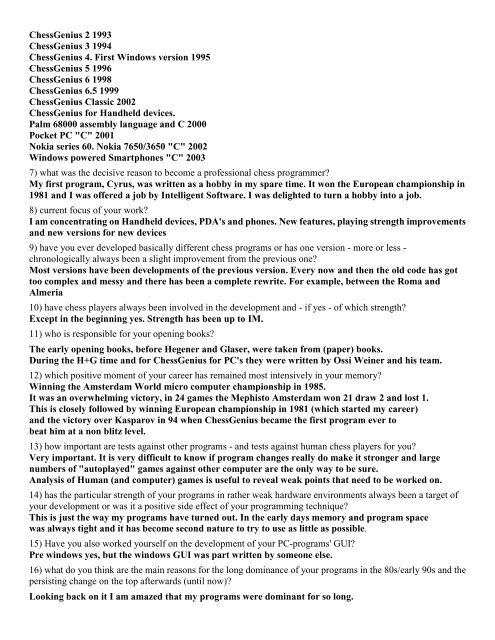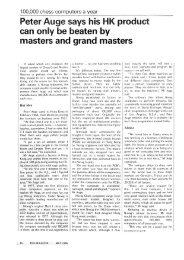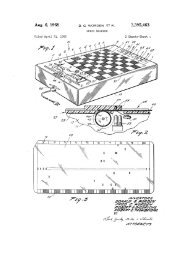Richard Lang - Chess Computer UK
Richard Lang - Chess Computer UK
Richard Lang - Chess Computer UK
- No tags were found...
Create successful ePaper yourself
Turn your PDF publications into a flip-book with our unique Google optimized e-Paper software.
<strong>Chess</strong>Genius 2 1993<strong>Chess</strong>Genius 3 1994<strong>Chess</strong>Genius 4. First Windows version 1995<strong>Chess</strong>Genius 5 1996<strong>Chess</strong>Genius 6 1998<strong>Chess</strong>Genius 6.5 1999<strong>Chess</strong>Genius Classic 2002<strong>Chess</strong>Genius for Handheld devices.Palm 68000 assembly language and C 2000Pocket PC "C" 2001Nokia series 60. Nokia 7650/3650 "C" 2002Windows powered Smartphones "C" 20037) what was the decisive reason to become a professional chess programmer?My first program, Cyrus, was written as a hobby in my spare time. It won the European championship in1981 and I was offered a job by Intelligent Software. I was delighted to turn a hobby into a job.8) current focus of your work?I am concentrating on Handheld devices, PDA's and phones. New features, playing strength improvementsand new versions for new devices9) have you ever developed basically different chess programs or has one version - more or less -chronologically always been a slight improvement from the previous one?Most versions have been developments of the previous version. Every now and then the old code has gottoo complex and messy and there has been a complete rewrite. For example, between the Roma andAlmeria10) have chess players always been involved in the development and - if yes - of which strength?Except in the beginning yes. Strength has been up to IM.11) who is responsible for your opening books?The early opening books, before Hegener and Glaser, were taken from (paper) books.During the H+G time and for <strong>Chess</strong>Genius for PC's they were written by Ossi Weiner and his team.12) which positive moment of your career has remained most intensively in your memory?Winning the Amsterdam World micro computer championship in 1985.It was an overwhelming victory, in 24 games the Mephisto Amsterdam won 21 draw 2 and lost 1.This is closely followed by winning European championship in 1981 (which started my career)and the victory over Kasparov in 94 when <strong>Chess</strong>Genius became the first program ever tobeat him at a non blitz level.13) how important are tests against other programs - and tests against human chess players for you?Very important. It is very difficult to know if program changes really do make it stronger and largenumbers of "autoplayed" games against other computer are the only way to be sure.Analysis of Human (and computer) games is useful to reveal weak points that need to be worked on.14) has the particular strength of your programs in rather weak hardware environments always been a target ofyour development or was it a positive side effect of your programming technique?This is just the way my programs have turned out. In the early days memory and program spacewas always tight and it has become second nature to try to use as little as possible.15) Have you also worked yourself on the development of your PC-programs' GUI?Pre windows yes, but the windows GUI was part written by someone else.16) what do you think are the main reasons for the long dominance of your programs in the 80s/early 90s and thepersisting change on the top afterwards (until now)?Looking back on it I am amazed that my programs were dominant for so long.




